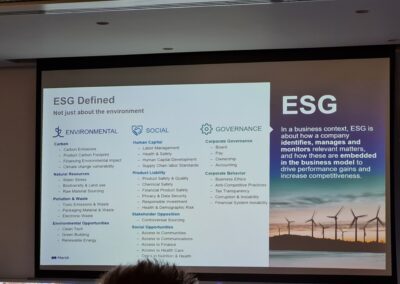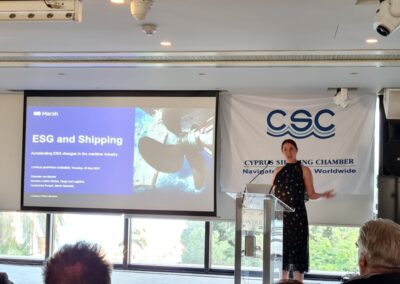On May 25, 2023, the monthly meeting of CSC members was held at the Amathus Hotel. The Unibaltic Group was represented by Mr. Adam Barecki.
The meeting was opened by the Vice President of the Chamber, Mr. Andreas Neophytou. He presented the activities of the Chamber in the last month. The second part of the meeting was aimed at bringing ESG matters closer to the members of the Chamber. On this occasion, a special presentation was prepared by Mrs. Charlotte van Bouwel from the consulting company Marsh.
She started by explaining the basics of ESG, which stands for environmental, social, and governance, and its application to the shipping industry. ESG is a way of measuring how well a company is doing in terms of sustainability and making a net-positive contribution to society. The shipping industry has been significantly affected by the introduction of ESG. Environmental, social, and governance (ESG) is a framework for assessing a company’s sustainability and social impact. ESG has gained traction in recent years as a result of its potential to aid companies in performing well while also having a net-positive contribution to society on society.
She added that ESG is also a risk management tool for sustainability and societal impact. This implies that when companies make investments, they can use ESG to assess how sustainable and beneficial their investments are to society. ESG is a comprehensive concept that intersects with other terms such as corporate sustainability and corporate social responsibility (CSR). However, ESG stands out because it provides more specific and standardized metrics for tracking progress. It is natural that ESG started knocking on the door of the shipping industry, with its global companies and fleets accounting for almost 3% of global greenhouse gas (GHG) emissions annually, and with the International Maritime Organization (IMO) focusing more than ever on environmental topics. ESG, as a key factor in the Poseidon Principles and an evolving landscape in greener ship financing, will play a huge role in the day-to-day decision-making of ship owners and executives.
The “(E)nvironmental” aspect of ESG refers to a company’s effect on our planet, including its use of natural resources, its greenhouse gas emissions, and its overall environmental footprint. It also includes the company’s policies and practices around environmental stewardship and sustainability. It’s especially important for the shipping industry. Shipping is responsible for about 3% of global greenhouse gas (GHG) emissions, and that number is expected to grow. However, the environmental burden of shipping isn’t just limited to air emissions; noise pollution, vessel discharges, and other factors can also harm our ecosystems. The International Maritime Organization (IMO) has set strategic goals to reduce the carbon intensity of international shipping by 40% by 2030 and 70% by 2050 compared to 2008 levels. They also want to decrease total annual greenhouse gas emissions by 50% by 2050 compared to 2008 levels. To meet these targets, new regulations have been introduced that require all ships above 400 GT to measure their Energy Efficiency Existing Ship (EEXI). Ships above 5000 gross tonnages must also be ranked based on their carbon intensity (CII). In addition, the European Union has proposed that shipping be included in the Emissions Trading Scheme (ETS) by 2024, which means that shipping companies will have to purchase emission allowances, adding to their compliance costs.
The „(S)ocial” pillar of ESG refers to a company’s effect on society, including its employees, customers, suppliers, and the communities in which it operates. The qualitative nature of social impact makes it difficult to measure and analyze. Furthermore, social issues are estimated differently in different countries, which often leads to the social pillar being overshadowed by the pressing matter of climate change. However, a worldwide event like the pandemic changed that, highlighting the importance of this metric. Issues such as health and safety, human rights, labor standards, diversity, inclusion, and data privacy became more noticeable, pushing companies to examine how they treat their most important asset: their people. In the shipping industry, social issues are prevalent, especially concerning the welfare of seafarers. Seafarers are often subjected to long working hours, poor living conditions, and inadequate wages. To address these issues, the International Labour Organization (ILO) has developed the Maritime Labour Convention, which sets out minimum standards for seafarers’ working and living conditions. Additionally, IMO’s International Safety Management (ISM) Code plays a pivotal role in providing an international standard for the safe management and operation of ships. Shipping companies are expected to comply with these standards to ensure the welfare of their employees.
The „(G)overnance” aspect of ESG refers to the systems and processes used by a company to manage and oversee its operations, as well as the relationships between a company’s management, board of directors, shareholders, and other partners. Governance is an important aspect of ESG because it provides a framework for ensuring that a company operates transparently and responsibly. This includes establishing clear policies and procedures for decision-making, risk management, and financial reporting, as well as ensuring that the company’s leadership is accountable to shareholders and partners.
It was a great opportunity to talk with the lecturer about the development and implementation of the ESG strategy. Mr. Adam Barecki exchanged his view on the EU Corporate Sustainability Reporting Directive and the EU standard for such reporting developed by the European Commission, the implementati on of which will require large financial outlays incurred by Shipowners.



